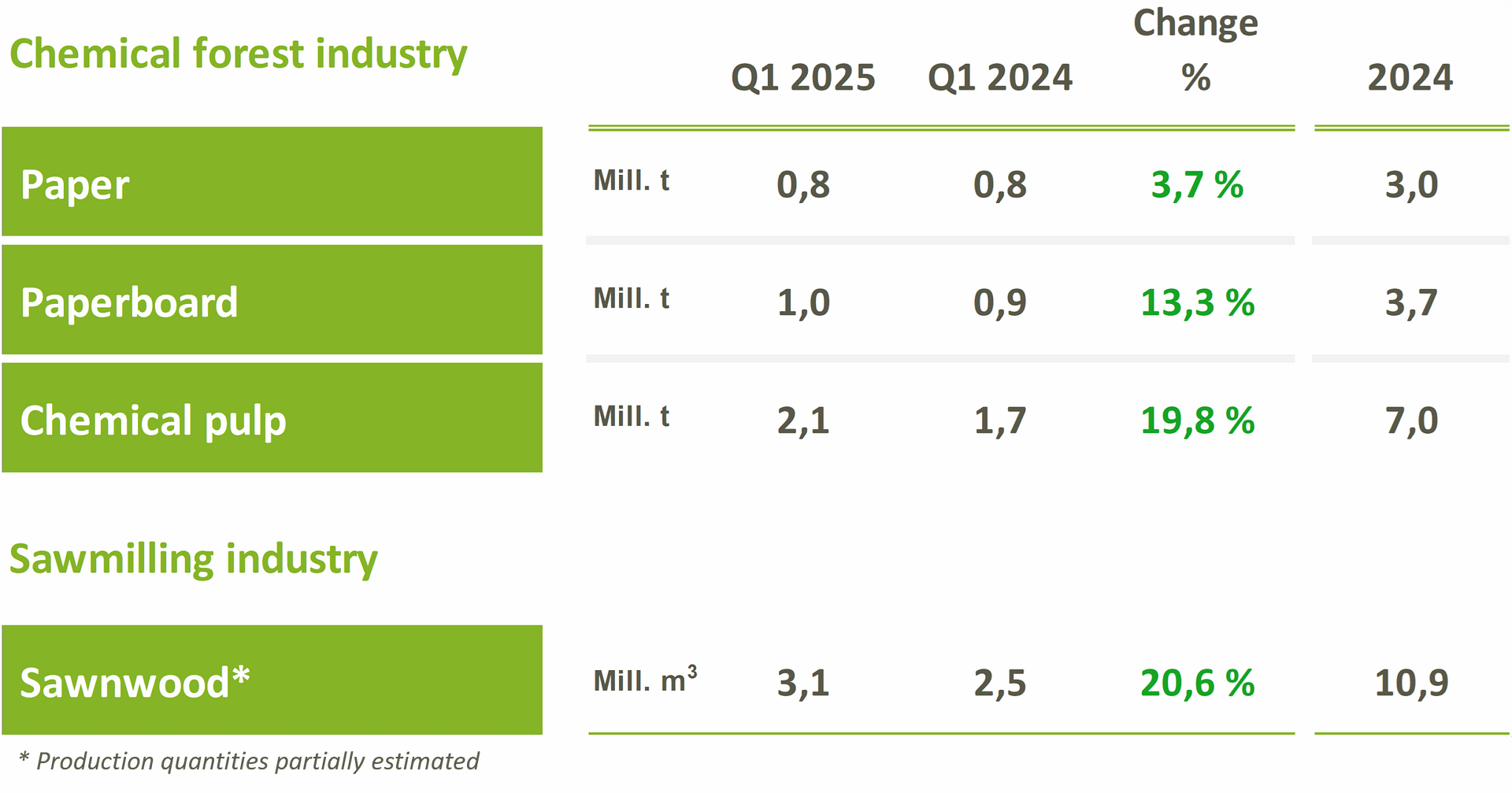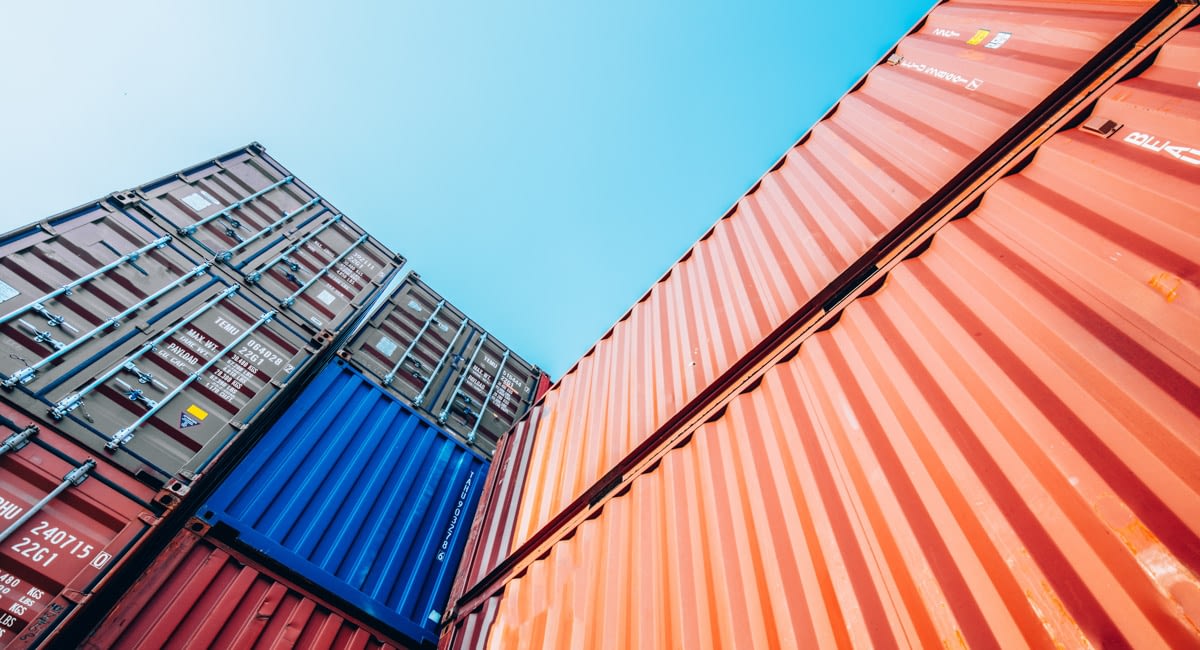The impact of tariffs on the forest industry
International trade is undergoing upheaval due to geopolitical forces. The wave triggered by the new U.S. administration is reaching Finland and the forest industry as well. The Finnish Forest Industries Federation aims to provide the best possible situational overview for the industry amidst the rapidly evolving international trade and trade policy environment.
This continuously updated article compiles key current developments relevant to international trade in the forest industry and the impacts of changing tariffs.
In brief:
- The review initiated by President Trump to enhance U.S. forestry and lumber production continues.
- The U.S. has imposed 15 % general tariffs on European products, which affect the Finnish forest industry both directly and indirectly.
Developments in 2025
Import tariffs affecting the sector:
- Pulp 0 %
- Paper and board 15 %
- Softwood sawn timber (softwood lumber) and wood raw material 10 %
- Other wood products under HS Chapter 44: 15 %.
U.S. Tariffs on Canada, China, and Brazil
Canada: 35 %, excluding products covered by the United States-Mexico-Canada Agreement (USMCA), which include pulp, paper, and board and are subject to zero tariffs. The 35 % anti-dumping and countervailing duty on coniferous wood / softwood lumber has, as a result of the broader Section 232 investigation on wood products, increased to an average of 45 %.
Brazil: 50 %, excluding several grades of pulp. Imports of paper and board are subject to a 50 % tariff.
China: Trade negotiations between the U.S. and China have been extended until early November 2026. The current situation of U.S. 47 % – China 10 % tariffs remains in effect.
24 January 2026: President Trump threatened to impose 100% tariffs on all imports from Canada to the United States if Canada proceeds with the trade agreement it has concluded with China. As Canada is the United States’ most important foreign supplier of pulp, paper and board products, such a decision would likely have a significant impact on trade between the two countries, as well as on trade between the EU and Canada.
21 January 2026: President Trump withdrew the tariff threat he had made on 17 January against Finland and seven other countries, following discussions at the World Economic Forum in Davos. The talks concerned Greenland.
20 January 2026: The European Parliament suspended the handling of the EU–US trade agreement due to Trump’s tariff threats.
17 January 2026: The EU prepared counter-tariffs covering €93 billion worth of imports from the United States. These could be implemented if no resolution to the situation is reached.
17 January 2026: President Trump threatened to impose an additional 10% tariff on eight European countries – Finland, Norway, Sweden, France, Germany, the United Kingdom and the Netherlands – starting from 1 February. In June, the tariffs would rise to 25%. Trump stated that the tariffs would be lifted once Greenland is under US control.
December 31: President Trump issued an executive order postponing for one year the planned increase in tariffs on upholstered furniture, kitchen cabinets, dressing tables and bathroom vanity tops, which was originally scheduled to take effect on 1 January 2026. Under the original order issued last September, the 25 per cent import duty on these products will remain in force.
October 30: the Presidents of the United States and China met and held discussions. As a result of the negotiations, President Trump reduced certain tariffs imposed on China and postponed the implementation of specific exemptions until early November 2026. Starting November 10, the United States will suspend for one year the countermeasures related to the Section 301 investigation into China’s efforts to achieve a dominant position in the maritime, logistics, and shipbuilding sectors. China, in turn, postponed by one year the implementation of export restrictions on rare earth metals announced in October. Fact Sheet: President Donald J. Trump Strikes Deal on Economic and Trade Relations with China – The White House
September 29: President Trump issued a proclamation related to the Section 232 investigation on wood raw materials and wood products, under which a 10 % ad valorem tariff is applied to imports of coniferous wood raw materials and wood products. For other mechanical forest industry products excluded from the implementing regulation (as of April 2, 2025), the duty rate is 15 %.
- Imports of certain upholstered wood products, kitchen cabinets, and kitchen furniture are subject to a 25 % ad valorem tariff.
- Import duty on softwood lumber from Canada is expected to rise to an average of 45 %.
The tariffs will enter into force on October 14, 2025.
By October 2026, the Secretary of Commerce must provide the President with an update on imports of hardwood and sawn timber, their markets, and the domestic industry. Following this, the President will decide whether an additional tariff on hardwood or sawn timber imports is necessary.
A previous executive order issued by President Trump excluded many product categories of the mechanical forest industry from tariffs. This exclusion will now be removed.
However, products added to the reciprocal tariffs exemption list will remain duty-free, including pulp types that are essential to the industry:
- 4703.11.00 Unbleached chemical wood pulp of coniferous species
- 4703.21.00 Semi-bleached or bleached chemical wood pulp, of coniferous species
- 4703.29.00 Semi-bleached or bleached chemical wood pulp, non-coniferous
September 5: President Trump signed an executive order updating the United States’ existing system of reciprocal tariffs. The revised set of product exemptions, additions, and removals applies to goods imported on or after September 8, 2025.
- Products directly relevant to the sector added to the reciprocal tariffs exemption list (p. 32):
- 4703.11.00 Chemical wood pulp, unbleached, of coniferous wood
- 4703.21.00 Chemical wood pulp, semi-bleached or bleached, of coniferous wood
- 4703.29.00 Chemical wood pulp, semi-bleached or bleached, of non-coniferous wood
August 21: Excerpts from the United States–EU Joint Statement Framework Agreement:
- The United States commits to applying to European Union products whichever is higher: either the U.S. Most-Favored-Nation (MFN) tariff or a 15 percent tariff, consisting of the MFN tariff and a reciprocal tariff.
- The United States will seek to ensure that any tariff resulting from the ongoing Section 232 investigation on wood products does not exceed 15 percent.
- The European Union commits to working to address the concerns of U.S. producers and exporters regarding the EU Deforestation Regulation (EUDR), to avoid disproportionate impacts on trade between the United States and the EU.
- In addition to the recently agreed de minimis exemption, the European Commission commits to working towards greater flexibility in the implementation of the Carbon Border Adjustment Mechanism (CBAM).
August 12: U.S. President Donald Trump has decided to extend the tariff truce with China for 90 days, until November 9.
August 1: President Trump issued an executive order postponing by one week the implementation of the 15 % import tariffs imposed on the EU. The new effective date for the tariffs is August 7.
Wood and restricted paper products excluded from the original reciprocal tariffs, as well as products covered by the Section 232 investigation, remain exempt from the new reciprocal tariff.
August 1: A new tariff level on EU export products to the United States, as agreed upon in the recent EU-US trade negotiations, is set to take effect. The United States will apply a maximum tariff of 15 % on the majority of EU exports, including pulp, paper, and cardboard. Negotiations on the detailed terms of the final agreement are still ongoing.
Until the United States concludes its Section 232 investigation concerning wood products, the tariff on timber exports from the European Union to the United States is expected to remain at 0 % for most wood-related goods. The European Commission will continue working with the United States to ensure that any future tariffs resulting from the investigation do not exceed the 15 % threshold for the EU.
Tariffs and Agreements Initiated by President Trump:
- Negotiations with China are ongoing.
- Japan and South Korea: 15 %
- Canada: 35 %
- European Union: 15 %
- BRICS countries: Brazil 50 %, India 25 %, South Africa 30 %
- Mexico: Tariffs postponed for 90 days
July 28: The European Union and the United States have reached an agreement on tariffs. The import tariff rate set for the EU is 15 %. The details of the agreement will become clearer in the coming weeks.
July 12: U.S. President Donald Trump announced 30 % import tariffs on the European Union, set to take effect at the beginning of August. The EU has expressed its willingness to continue negotiations and postpone the implementation of its own countermeasures until 6 August to reach an agreement before August.
Import tariffs effective from August 1: Japan and South Korea 25 %, Brazil 50 %, Canada 35 %, EU 30 %, and Mexico 30 %, along with numerous other countries with varying rates.
July 9: The 90-day negotiation pause granted by President Trump in April ended today. However, instead of a deal or reciprocal tariffs, the U.S. administration announced that implementation of the tariffs would be postponed until early August. Negotiations between the EU and the U.S. continue in hopes of reaching a framework agreement.
June 11: Announcement of the approval of a framework agreement between the United States and China aimed at reducing trade tensions and concluding negotiations by August 12. If no agreement is reached, the tariff levels that were lowered in May will be reinstated.
May 12: The United States and China have agreed to freeze tariffs at a lower level for a period of 90 days. The United States will reduce tariffs on Chinese exports from 145 percent to 30 percent, while China will reduce tariffs on U.S. exports from 125 % to 10 %. The tariff reductions are to be implemented by May 14.
April 17: The U.S. has imposed tariffs on China in the maritime, logistics, and shipbuilding sectors. These actions may have indirect impacts on the logistics chains of the forest industry.
As of October 14 The U.S. will levy tariff fees on:
- Chinese shipping companies and operators based on vessel net tonnage
- Operators of Chinese-built vessels based on net tonnage or unloaded containers for ships arriving at U.S. ports. The fees are expected to increase gradually in the coming years.
April 14: The European Commission officially delays implementation of countermeasures related to aluminium and steel tariffs by 90 days, until July 14.
April 11: China has announced an increase in import tariffs on American products to 125 %. These new tariffs will take effect on Saturday, April 12, 2025. According to the White House, the U.S. tariff rate on Chinese imports stands at 145 %.
April 10: The European Commission responded to the U.S. delay in implementing general tariffs by announcing a 90-day postponement of its own countermeasures.
April 9 – Reciprocal Tariffs and Exemptions:
The U.S. introduced 20 % reciprocal tariffs on April 9 but postponed their implementation the same day for a 90-day negotiation period. China, including Hong Kong and Macao, became subject to a 125 % import tariff. In response, China imposed an 84 % import tariff on all U.S.-origin products. Other countries were moved to a 10 % general tariff, with exceptions defined under customs codes 9903.01.26–9903.01.34. Of relevance to the forest industry is code 9903.01.32, which includes bioenergy, raw wood, sawn timber, and various other wood products.
April 5 – General Tariffs on Imports from the EU Implemented:
The U.S. imposed a 10 % general tariff on April 5. The tariff list includes paper, board, and pulp, while bioenergy, raw wood, and some mechanical forest industry products are excluded. In response, China announced 34 % retaliatory tariffs on all U.S. products starting April 10. The EU expressed its readiness to negotiate but simultaneously prepared countermeasures to the U.S. tariffs. Industry associations responded: the Confederation of European Paper Industries (Cepi) and the European Confederation of Woodworking Industries (Cei-Bois) issued updated statements on the matter.
April 3: The U.S. imposed a 20 % general tariff on all goods transported from the EU to the U.S. However, the implementation order excluded several forest industry products. Nevertheless, the general tariffs affect the Finnish forest industry both directly and indirectly. In 2024, the U.S. was Finland’s third most important export market. The uncertainty in the U.S. market has wider repercussions for the industry’s global trade.
March 26: President Trump imposed a 25 % tariff on imported cars starting April 2. In a televised speech, he also mentioned tariffs to reduce reliance on imported timber.
March 12: The U.S. 25 % import tariffs on all imported steel and aluminium came into effect. The European Union quickly published a Commission proposal for countermeasures and began stakeholder consultations. The countermeasure product list includes forest industry products. The Ministry for Foreign Affairs has requested comments from companies and organizations.
March 1: President Trump directed the U.S. Department of Commerce to investigate the national security risks associated with timber imports. This could provide a legal basis for new tariffs. The investigation will assess whether timber imports to the U.S. market are occurring at the expense of U.S. economic prosperity and national security. The investigation must be completed by November 26. President Trump also issued an order to strengthen U.S. forestry and timber production.






